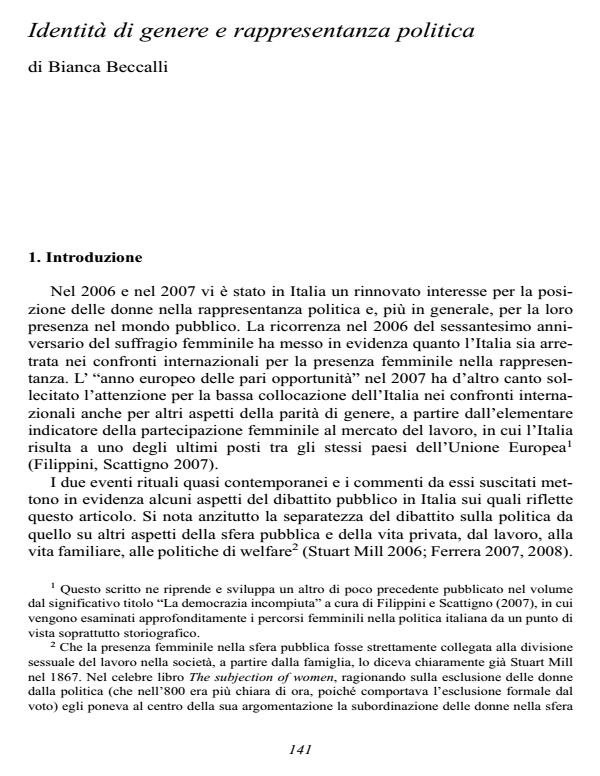Identità di genere e rappresentanza politica
Titolo Rivista PARTECIPAZIONE E CONFLITTO
Autori/Curatori Bianca Beccalli
Anno di pubblicazione 1905 Fascicolo 2008/0
Lingua Italiano Numero pagine 16 P. Dimensione file 95 KB
DOI
Il DOI è il codice a barre della proprietà intellettuale: per saperne di più
clicca qui
Qui sotto puoi vedere in anteprima la prima pagina di questo articolo.
Se questo articolo ti interessa, lo puoi acquistare (e scaricare in formato pdf) seguendo le facili indicazioni per acquistare il download credit. Acquista Download Credits per scaricare questo Articolo in formato PDF

FrancoAngeli è membro della Publishers International Linking Association, Inc (PILA)associazione indipendente e non profit per facilitare (attraverso i servizi tecnologici implementati da CrossRef.org) l’accesso degli studiosi ai contenuti digitali nelle pubblicazioni professionali e scientifiche
The occasion for the article is the public debate around the decline of women’s participation in the political process in Italy since the mid 1990’s and during the following decade; the debate has addressed the reasons of the phenomenon, as well as the issue of whether and how to contrast the trend. The thesis of women’s "natural" distance from formal democratic politics has emerged as an influential point of view in the debate, shared by scholars and social actors from different backgrounds, such as a number of feminists, neo-liberal theorists, and religious neo-conservatives. According to this point of view, the marginal position of women in politics, and in the positions of power in general, is due to their own choices, to their "preferences". Preference theory, with its essentialist overtones, is a main polemical target of the article. In order to denaturalize the relationship between gender identity and political participation, the Italian case is examined in a historical perspective, and it is compared to other national cases; also the different national strategies of promotion of women are considered. The historical and international variations are remarkable, and call for- historical and sociological explanations. In the background of the article lay these general questions: a) within the realm of politics, different modes of political participation have to be considered: participatory democracy and representative democracy are two poles which regard the whole range of democratic activities, but which are particularly relevant to the fluctuating participation of women. b) How much is "politics" special in promotion of marginal groups? Different social areas, such as the sphere of work, show patterns of marginalisation of vertical and horizontal segregation, and are possible targets of positive actions. c) The "justification" of the need of women’s presence in representative democracy as some specific characteristics, which the article deals with, namely the frame of the equal opportunities approach, the mirror democracy theory, and deficit of democracy approach. The tree different perspectives are discussed at the end of the article.
Parole chiave:Women’s Participation; Feminism; Essentialism; Democracy Theory; Segregation.
Bianca Beccalli, Identità di genere e rappresentanza politica in "PARTECIPAZIONE E CONFLITTO" 0/2008, pp , DOI: